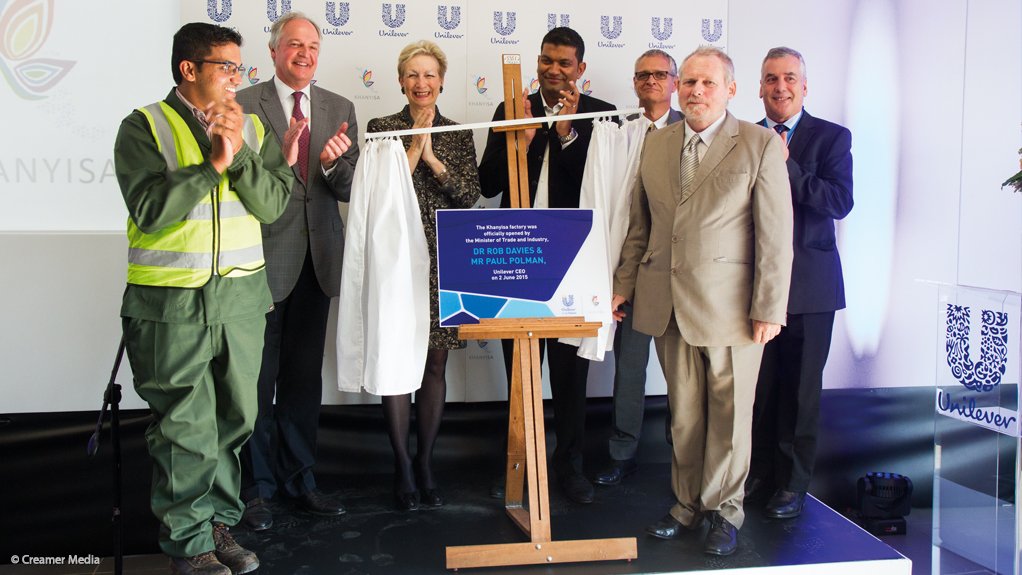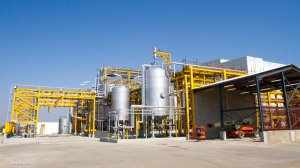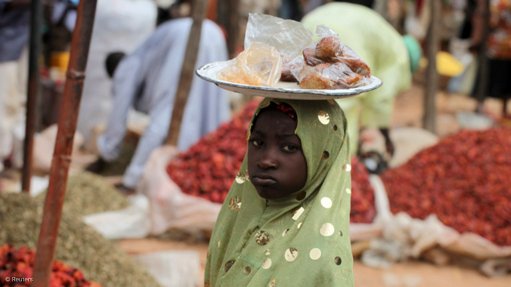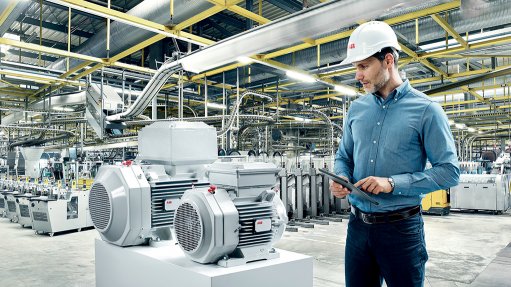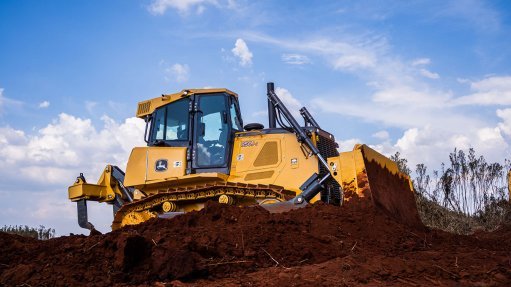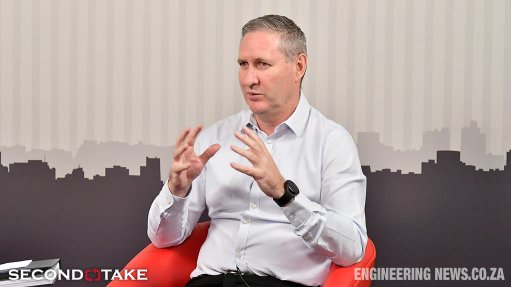S African manufacturing sector receives R1.4bn boost with new Unilever facility
Adding to its almost R4-billion investment in the South African consumer goods manufacturing space over the last four years, international group Unilever has officially unveiled its fourth South African production facility, in Boksburg, Johannesburg – a R1.4-billion homecare products factory that it hopes will act as a springboard for its products into the frontier African markets.
The facility would, once fully commissioned by the end of the year, produce 150 000 t/y of household and laundry detergents, replacing the company's original homecare products factory located nearby, while delivering a 50% reduction in the carbon emission footprint and a 70% reduction in water use per ton on that of the original factory.
The new factory, dubbed ‘Khanyisa’, would produce household brands including Omo washing powder, Handy Andy liquid, Domestos, Comfort fabric softener and Sunlight detergent, besides others.
It would also increase the group’s local homecare production capacity by 67%, Unilever global CEO Paul Polman said at the launch of the facility on Tuesday.
Forming part of the company’s R3-billion Capacity Transformation Project investment, which looked to reduce the group’s carbon footprint while doubling the size of the business, the plant would achieve additional environmental efficiencies through rainwater harvesting and treatment, water recycling and energy efficient lighting and processes.
Unilever also planned to establish a purpose-built combined heat and power plant, which would provide the facility with a portion of its energy needs.
“Transforming our production capacity is one of four critical initiatives that we are driving to meet expected growth in demand. This factory will enable us to better serve our consumer with innovation and green technology, while simultaneously improving service levels for our customers.
“Our aim is to have the right stock at the right place in record time, matching the quantities expected by shoppers,” he commented.
Meanwhile, Trade and Industry Minister Dr Rob Davies told attendees at the launch that the Unilever plant had benefited from the Department of Trade and Industry’s (DTI’s) 12i Tax Allowance Incentive scheme, with a qualifying investment value of R1.2-billion, an investment allowance of R350-million, and a training allowance of R7-million.
This incentive aimed to support greenfield investments in the form of new industrial projects that only used new and unused manufacturing assets.
Of Unilever’s total South African manufacturing investment of R4-billion, the group had received nearly R1.9-billion in incentives from the DTI.
Other investments by the group include Durban’s Maydon Wharf soap, detergents, cleaning products, polishing preparations, perfumes and toilet preparations factory, the Indonsa foods production plant, also in Durban, and the Southpole ice cream plant, in Johannesburg.
“It is more than that we have offered tax incentives...we have actively worked together with Unilever on this. We would like local agricultural manufacturers to start benefiting from these investments by being suppliers for plants like the Idonsa factory.
“Our seventh iteration of the Industrial Policy Action Plan, launched on May 7, focuses on upscaling our manufacturing sector, footprint and full scale industrialisation. With the roll-out of the Black Industrialists [Development] Programme, Unilever’s investment could play a key role in knowledge sharing, technology and skills transfer to black industrialists in the consumer goods and chemicals sectors, thus creating an opportunity for emerging companies to be able to participate in the mainstream economy,” he said.
Elaborating on the rationale behind the Khanyisa plant, Polman noted that the company had observed growing demand from the emerging markets, which now accounted for 60% of Unilever’s overall business.
“We are currently seeing growth of up to 90% from these markets, so it’s not surprising that we are establishing plants in these regions,” he held.
Comments
Press Office
Announcements
What's On
Subscribe to improve your user experience...
Option 1 (equivalent of R125 a month):
Receive a weekly copy of Creamer Media's Engineering News & Mining Weekly magazine
(print copy for those in South Africa and e-magazine for those outside of South Africa)
Receive daily email newsletters
Access to full search results
Access archive of magazine back copies
Access to Projects in Progress
Access to ONE Research Report of your choice in PDF format
Option 2 (equivalent of R375 a month):
All benefits from Option 1
PLUS
Access to Creamer Media's Research Channel Africa for ALL Research Reports, in PDF format, on various industrial and mining sectors
including Electricity; Water; Energy Transition; Hydrogen; Roads, Rail and Ports; Coal; Gold; Platinum; Battery Metals; etc.
Already a subscriber?
Forgotten your password?
Receive weekly copy of Creamer Media's Engineering News & Mining Weekly magazine (print copy for those in South Africa and e-magazine for those outside of South Africa)
➕
Recieve daily email newsletters
➕
Access to full search results
➕
Access archive of magazine back copies
➕
Access to Projects in Progress
➕
Access to ONE Research Report of your choice in PDF format
RESEARCH CHANNEL AFRICA
R4500 (equivalent of R375 a month)
SUBSCRIBEAll benefits from Option 1
➕
Access to Creamer Media's Research Channel Africa for ALL Research Reports on various industrial and mining sectors, in PDF format, including on:
Electricity
➕
Water
➕
Energy Transition
➕
Hydrogen
➕
Roads, Rail and Ports
➕
Coal
➕
Gold
➕
Platinum
➕
Battery Metals
➕
etc.
Receive all benefits from Option 1 or Option 2 delivered to numerous people at your company
➕
Multiple User names and Passwords for simultaneous log-ins
➕
Intranet integration access to all in your organisation



